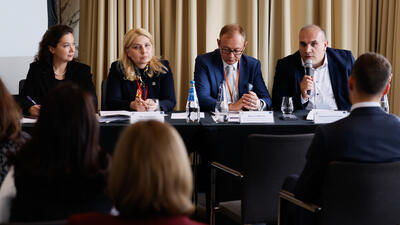- Home
- About us
-
Our work
- Elections
- Civil society
- Rule of law
- Democratic governance
- Legislative support
- Freedom of religion or belief
- Freedom of peaceful assembly
- Gender-based violence
- Human rights defenders
- Human rights and new technologies
- Human rights and gender-responsive security sector
- Human rights and anti-terrorism
- Migration and freedom of movement
- National human rights institutions
- Torture
- Trafficking in human beings
- Hate crime
- People with disabilities
- Racism, xenophobia and discrimination
- Roma and Sinti
- Gender equality
- Special meetings
- News
- Events
- Resources
News Item
Democratic governance challenges in the OSCE region debated at Warsaw conference
With democratic institutions under pressure across the OSCE region, the OSCE Office for Democratic Institutions and Human Rights (ODIHR) brought together experts and officials at the Warsaw Human Dimension Conference to discuss how democracy can adapt and remain resilient in times of change.

- Issued on:
- Issued by:
- OSCE Office for Democratic Institutions and Human Rights
- Fields of work:
- Good governance, Democratization
With democratic institutions under pressure across the OSCE region, the OSCE Office for Democratic Institutions and Human Rights (ODIHR) brought together experts and officials at the Warsaw Human Dimension Conference to discuss how democracy can adapt and remain resilient in times of change.
“War is a very difficult environment for building democratic institutions,” said Olga Aivazovska, Head of the Board of the Civil Network OPORA, in Ukraine. “While there is no universal formula for supporting democratic consolidation, there is a need to continuously support its constituent elements, including active civil society and wide civic participation, in order to combat fear and misinformation.”
Today’s side event, organized as part of Stronger Democratic Institutions in Eastern Partnership Countries: an ODIHR project supported and funded by the EU, looked at shared challenges facing many states, from political polarization and stalled reforms to declining public trust.
Panellists emphasized the need to strengthen integrity, inclusion and accountability, particularly in times of instability and limited dialogue between state institutions and society. Civic participation and institutional legitimacy emerged as central themes, alongside the importance of ensuring that underrepresented groups are not left behind in political processes.
“Over the last two years, the introduction and expansion of participatory budgeting at the local level has generated strong interest and unexpectedly high participation, at times comparable to turnout in local elections,” said Hamazasp Danielyan, a former parliamentarian from Armenia. “The lesson is clear: creating clear, simple mechanisms to increase participation is an effective way to engage citizens, a precondition for sustaining support for democratic institutions.”
Participants also reflected on the wider impact of war, shifting geopolitical conditions and changing policy priorities on democratic development. By sharing practical experiences and approaches, the event underlined how targeted tools, expert guidance and tailored support can reinforce democratic resilience and ensure reforms are trusted, sustained and benefit citizens.